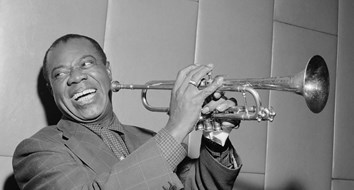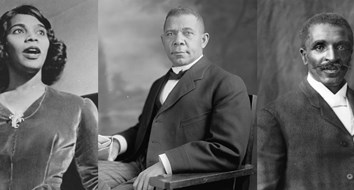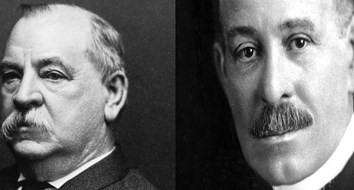The fullest appreciation of Leonard Read’s “I, Pencil” derives from this understanding: The gentle, persuasive, and irresistible appeal of the essay is a direct reflection of the personality of its author. What you see in the essay is what you got in the man himself.
He Who Strikes the Second Blow Starts the Fight
I can offer this observation from personal experience, but I can also affirm that it’s a view widely shared by those who knew Leonard and worked with him for far longer than I did. I was fortunate to know him only in the final six years of his long life, from when I first met him in 1977 until he passed in 1983. This account of an incident in Leonard’s career comes from someone who knew him for decades—his long-time FEE colleague, Bettina Greaves, in her 1998 article, Leonard E. Read, Crusader:
One day the mail brought a vicious three-page diatribe from a labor-union organizer who attacked Read’s position, expressed in an article about a recent airline dispute, that there was no moral right for workers…to forcibly prevent willing workers from occupying vacated jobs [of strikers].
Read took no notice of the correspondent’s ill temper, but used a “turn-the-other-cheek approach”; he sent a serious and courteous reply with two small books.
Some weeks later the union man, “Whitey,” wrote back, authorizing Read “to become my director of reading. Send me anything which in your judgment will help my thinking, and with invoice.” Whitey changed his occupation and eventually the two men met in Seattle when Whitey drove Read to the airport after a lecture. Read reminded Whitey of his first letter. Read wrote later that Whitey felt “crushed to think he had written in such a vein to one who reacted as [Read] had.”
“Suppose I had replied in kind?” Read recalled asking. “Would you and I be riding together?”
“I’ll say we wouldn’t!”
“Whitey, let me explain what I did to you.” Holding his plane ticket against the windshield, Read asked, “What holds it there?”
“The tension of your finger.”
“You are right, Whitey. It is known as the law of polarity or the tension of the opposites. Now observe what happens when the tension is removed.” The ticket fell to the floor. “Well, that’s precisely what I did to you. I removed the tension; I gave you nothing to scratch against.”
Read then quoted an old Arab proverb, “He who strikes the second blow starts the fight.” “When I didn’t strike back,” Read said, “there was no fight; you and I could become friends.”
This story has a sequel. “Perhaps two years later, there came a period of three months with no word from Whitey—most unusual. Finally, a letter arrived, explaining that he had been in a head-on auto collision. He was still in the hospital after 90 days. And then this: ‘but, Mr. Read, you should see the interest my three doctors are showing in our philosophy!’”
That story provides a revealing peek into a defining quality of Leonard’s personality. Though he knew as well as anyone that the stakes were high in the intellectual battle for liberty, his weapons looked nothing like those deployed on physical battlefields. He never aimed to insult a foe, let alone annihilate him. He saw every opponent as a potential ally, never an incorrigible enemy. And if you were already part-way to embracing liberty as a life philosophy, it would never occur to him to berate you until you came the full distance. He was a humble encourager, never a pompous, breast-beating turn-off. He intended to build a movement by building individuals, one at a time. He understood that one accomplishes that far more effectively with honey than with nettles.
Of Talks and of Walks
Do you know someone who professes liberty but whose personality (which is essentially the delivery mechanism) is night and day apart from Leonard’s? I think we all do. One of many that I know, in fact, comes readily to mind. So rather than contrast Leonard with some imaginary figure, allow me to use that real person I know. Let’s call him Mr. X because it would be so un-Leonard-like for me to reveal his name. It’s the point that counts here, not the person. The vast majority of you wouldn’t know him, anyway.
How many more people might be drawn to the philosophy of liberty if this positive approach were the default position of its advocates?
Mr. X exudes self-importance, far beyond anyone else’s assessment of him. His ego is insufferable, and it leads him to come across often as bombastic and overbearing. He’s frequently angry. His first impulse when he finds something he disagrees with, even if it’s from someone with whom he has wide agreement, is to get nasty. There’s a streak of jealousy and self-focus in him that prevents a compliment from ever escaping his lips. If he had received the same letter from Whitey that Leonard did, he would have denounced its author on social media. How effective do you think that approach would have been in Whitey’s case?
Now that you’ve read “I, Pencil,” you know how remarkably inoffensive it is, even when Leonard is gently chiding the “mastermind” mentality so hostile to the essay’s message. How many more people might be drawn to the philosophy of liberty if this positive approach were the default position of its advocates?
Intellectual Humility
The late Tibor Machan, who wrote many articles for FEE, once interviewed Leonard for Reason magazine. From that exchange, I extract these responses from Leonard for your review:
It was Socrates who said, “That man thinks he knows everything, whereas he knows nothing. I on the other hand, know nothing, but I know I know nothing.” And it is not until a person empties himself of know-it-allness that he can possibly rise in wisdom and understanding and excellence. And in that respect I resemble Socrates….
I just received a letter this morning from a friend in Australia who said, “Do you not get distraught because people do not let you know how much they’re benefiting from what you and the Foundation do?” And my answer is, “I do not.” The only way I would get distraught would be if I were not doing the best possible for me in realizing my own capabilities.
Those passages illustrate another critical aspect of Leonard’s persona. It showed up in all of his writing and especially in “I, Pencil.” In a phrase, it’s intellectual humility. He knew that when he started learning as a child, the universe of knowledge he didn’t know was as great then as it would still be on the last day of his earthly life. That meant he was introspective, focused on self-improvement and character-building. He never presumed more than he knew. He wouldn’t tell you how to run your business or your life. He even wrote a book, The Free Market and Its Enemy, in which he identified “the enemy” as “know-it-allness.”
My Mr. X, on the other hand, is a know-it-all. He’s certain of everything, including how your business should be run. He finds fault in your hiring, firing, and editorial decisions, though he’s privy to virtually none of the details and apparently doesn’t care to understand them. He second-guesses anything that bothers him. He’s a pure pontificator, not a builder of anything. He’s never created or managed a company or organization; never met a payroll; never wrestled with the vicissitudes of management, marketing, or fundraising. He slings arrows from his protected ivory tower and makes enemies of friends for no more reason than the perverse, personal satisfaction he derives from it. Perhaps he’s like the pre-Leonard version of Whitey.
“I, Pencil” is the epitome of intellectual humility in every dimension.
Which personality is more likely to build a movement, to encourage progress in both people and causes—that of Leonard Read or that of Mr. X? Rather obvious, isn’t it?
“I, Pencil” is the epitome of intellectual humility in every dimension. The pencil doesn’t take all the credit for his existence, does he? He doesn’t claim that he could make himself. No one, he argues, can make something as seemingly simple as a pencil all by himself. Grasp that key point fully, and you can’t help but be humbled. Both the story and the storyteller (the pencil) exude humility, as did the story’s author, Leonard Read.
"Hatching"
Roger Ream, FEE’s board chairman and a personal friend of mine for 40 years, is president of a leading organization in the liberty space, the Fund for American Studies. He worked with Leonard on the FEE staff in the 1970s. In Freedom’s Champion, Roger noted:
If I were to summarize Leonard’s vision, it would be by way of a quotation from the 17th-century essayist and poet Abraham Cowley, who wrote, “Liberty will not descend to a people; a people must raise themselves up to liberty. It is a blessing that must be earned before it can be enjoyed.”
Leonard was committed to spiritual growth, or what he would sometimes call “hatching.” He believed freedom was inextricably linked with the practice of self-improvement. Each of us should seek to continually develop our talents and our understanding. Leonard himself reached what he called the third level of libertarian leadership: a level of learning that leads others to seek one’s tutorship. Leonard’s philosophy was to “go only where you are called, but do everything in your power to be called.” He was often called by those seeking to learn about the freedom philosophy, and he traveled the world to speak, teach, and inspire people to commit to self-improvement.
As important a figure as Leonard Read was to the cause of liberty in the 20th century, he was never “full of himself.” At every turn, he focused the limelight on ideas, not personalities. He was happy to remain in the background as he promoted others, from Austrian economist Ludwig von Mises to any young student or professor who had yet to make a name for himself.
The Happiest of Happy Warriors
Mr. X is just the opposite. He craves attention and whines or lashes out when he doesn’t get it. He wants you to notice him so badly that he’ll even bore you with endless updates on his health, diet, and whereabouts. He’s the center of the universe, if you know what I mean. You’d never get any such impressions from Leonard Read. Which persona do you think attracts the most newcomers to liberty—or any philosophy, for that matter? Which is lastingly effective, and which is quickly forgotten?
The secrets to Leonard Read’s effectiveness—the reasons he is celebrated 35 years after his passing—lie in the magnetism of his character. He was the happiest of happy warriors, as suggested in this further passage from his interview in Reason:
Machan: You don't have some secret formula that you would divulge on how to keep fit in old age?
Read: Not exactly. But I would suggest that you control yourself against fretting, worry, anger, all the forms of stress. That's the main thing in life—keep away from stress—because it kills you. Keep happy; have fun!
“I, Pencil” reflects Leonard Read’s inner happiness. There’s not a whiff of sanctimony or pomposity in it. It’s a happy story with the happiest of uplifting, visionary tidings: Free people accomplish miraculous things! So let’s liberate, not denigrate. Let’s unleash, not hobble. Let’s have faith that freedom and goodwill can take humanity to levels of achievement unlimited by anything but our imaginations.
Thank you, Leonard Read, for cultivating the kind of remarkable personality that produced “I, Pencil” and which serves to this day as a model we all should seek to emulate!





